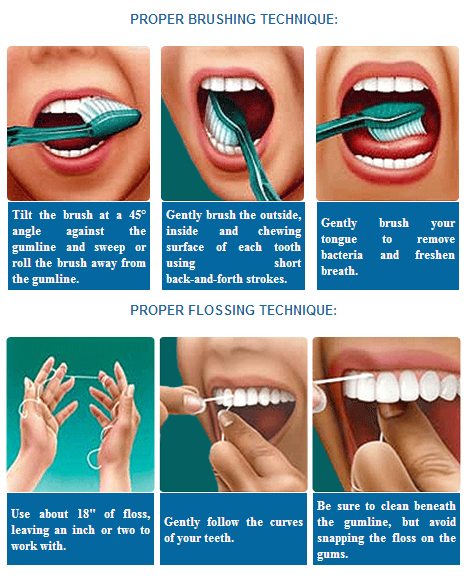Good oral hygiene results in a mouth that looks and smells healthy, This means:
If your gums do hurt or bleed while brushing or flossing , or you are experiencing persistent bad breath, see your dentist.
How is Good Oral Hygiene Practiced?
Maintaining good oral hygiene is one of the most important things you can do for your teeth and gums. Healthy teeth not only enable you to look and feel good, they make it possible to eat and speak properly. Good oral health is important to your overall well-being.
Daily preventive care, including proper brushing and flossing, will help stop problems before they develop and is much less painful, expensive, and worrisome than treating conditions that have been allowed to progress
In between regular visits to the dentist, there are simple steps that each of us can take to greatly decrease the risk of developing tooth decay, gum disease and other dental problems.
Good oral hygiene results in a mouth that looks and smells healthy, This means:

Each time sugar is eaten, the bacteria in plaque forms an acid. This is an acid attack. Repeated acid attacks form holes in the outer surface of the tooth causing decay.
Plaque is a sticky, colorless film of bacteria and sugars that constantly forms on our teeth. It is the main cause of cavities and gum disease, and can harden into tartar if not removed daily
Tartar is plaque that has hardened on your teeth. Tartar can also form at and underneath the gum line and can irritate gum tissues. Tartar gives plaque more surface area on which to grow and a much stickier surface to adhere, which can lead to more serious conditions, such as cavities and gum disease
Yes, daily flossing is part of our recommended home prevention therapy. Flossing is just as important if not more so than brushing. Dental plaque accumulates between teeth, which if left over time will lead to dental decay.
Regular checkups will allow your dentist to detect any problems such as gum disease, a dry mouth or other disorders that may be the cause. Maintaining good oral hygiene, eliminating gum disease and scheduling regular professional cleanings are essential to reducing bad breath.
There are several causes, the most common being ageing, staining substances (coffee, tea, colas, tobacco), trauma, tetracycline (antibiotic) staining, excessive fluoride, and nerve degeneration.